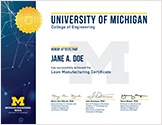SIX SIGMA CERTIFICATIONS
Lean Six Sigma Green Belt - Blended
Home » Professional Education » Six Sigma Certifications » Lean Six Sigma Green Belt – Blended
Key Information
Course Dates
Time Commitment
Remote-Live Offerings: four 2-hour check-ins, 1:00p-3:00p ESTAnn Arbor Offerings: 5-days In-Person in Ann Arbor, 8:00a-4:30pNot ready to commit?
Subscribe for email updates on future offerings and get a program brochure.
SIX SIGMA CERTIFICATIONS
Submit info below and we’ll email you our Six Sigma program brochure.
By submitting this form, you are consenting to receive marketing emails from Nexus. You may unsubscribe at any time.
By clicking 'Get Program Information' you are agreeing to receive emails from Nexus.
Earn your Green Belt from the University of Michigan.
Learn how to effectively solve problems by integrating Lean and Six Sigma within the DMAIC approach. Using a blend of examples and case studies drawn from manufacturing, transactional/service, and healthcare environments, this course will set you up with a structure to systematically frame problems, collect data productively, and implement sustainable solutions. Students have the flexibility to choose in-person or remote-live participation based on their learning preferences and needs.
Blended Track
This course focuses on applications drawn from a variety of industries, including manufacturing, transactional/service, and healthcare environments.
LEARNING OBJECTIVES
- Understand variability through the graphical representation of data
- Describe a process visually through process mapping techniques
- Apply DMAIC problem solving process toward process improvement at the Green Belt skill level
- Interpret test results and draw conclusions based on data
- Develop recommendations and control plans to improve processes
- Demonstrate understanding of the DMAIC methodology through the completion of a process improvement project outside of class
PROGRAM OVERVIEW
In-person course offerings are delivered in Ann Arbor, Michigan. Participants learn from instructors in the classroom during a week-long training. *The in-person Lean Six Sigma Green Belt Blended course is only available once a year.
Remote-live course offerings include a mix of pre-recorded lecture modules and remote live check-in sessions delivered over several weeks. Designed to reinforce learning, these interactive live sessions give you the opportunity to engage with U-M faculty, ask questions, and network with industry professionals. *The remote-live Lean Six Sigma Green Belt Blended course is only available once a year.
Continuous Improvement Overview and Define Phase
- Integrating Lean-Six Sigma/DMAIC Process
- Overview of DMAIC Problem Solving Process
- Linking Metrics to VOC (voice of the customer) and VOB (voice of the business)
- Identifying Classic Forms of Waste
- Define Phase and Creating Effective Project Charters
- Process Mapping: SIPOC, Swim lane, Process Mapping Diagram
Measure Phase
- Basic Graphical Tools and Descriptive Statistics
- Measuring Current State: Exploring and Understanding Data Patterns
- Basic Data Collection, Sampling, and Graphical Analysis Tools: Run Chart, Histogram, Box Plot
- Rolled Yield with Hands-on Exercise
Analyze Phase
- Value Stream Mapping
- Qualitative and Quantitative Process Analysis
- Stratification Analysis: Grouping Variables, Bar/Pie Charts Pareto Analysis and Drill Down, Multiple Box Plots, Scatter Plot
- Check Sheets and Pareto Analysis
Improve Phase
- Introduction to Hypothesis Testing
- Lean-Six Sigma Process Improvement Simulation
- Lean-Six Sigma Improvement Countermeasures
- Standardized Work, Mistake Proofing, Visual Aids
- Process Flow Improvement: Little’s Law, Batch Reduction/One Piece Flow
- Setup Reduction
- Simple Pull Systems
- Simplified Process/Cell Layout
- Volume/Mix Leveling and Takt Time
Control Phase, DMAIC Review, and Executing a DMAIC Project
- Methods of Control
- Conducting a Kaizen Improvement Event/Project Management
- DMAIC Gate Review Process
- Small Group Case Study Exercise (Applying DMAIC process)
In-Person
The in-person course consists of five days of classroom learning in Ann Arbor, running from 8:00 am to 4:30 pm daily. Students may be asked to complete minimal prework before each lesson. After successfully finishing the in-person course, students must complete the Lean Six Sigma Green Belt Certification Exam within 180 days.
Remote-Live
The remote-live course consists of approximately 60 hours of self-paced work, in addition to four 2-hour remote live check-in sessions. All requirements — including a self-paced Lean Six Sigma Green Belt Certification Exam — must be completed within 180 days after completion of the remote-live course.
Lean Six Sigma DMAIC analysis may be applied to a vast array of process improvement opportunities. Participants are expected to complete a project to practice and apply course concepts.
Participants pursuing their University of Michigan Lean Six Sigma Green Belt Certification are required to:
- Complete all required online lecture modules
- Participate in remote live check-in sessions
- Obtain an 80% or above on Green Belt Certification Exam
- Obtain approval of Green Belt Project Proposal by U-M faculty
- Successfully complete a Green Belt Project (reviewed by U-M faculty)
Upon successful completion, you will receive your University of Michigan Lean Six Sigma Green Belt Certification.
A basic understanding of statistical analysis methods is recommended, including:
- Basic Microsoft Excel Skills
- Basic Statistics
To view technical requirements, click here.
Administrative/Online Technical Support
Support staff are available via phone and email to help with administrative and technical issues during our normal business hours (Monday through Friday 8:00 a.m. to 5:00 p.m. Eastern Time).
Content Questions/Certification Project Support
Candidates are welcome to contact the course instructors for content questions and project support. The instructors will provide support via e-mail, phone consultation, and/or online videoconferencing.
ONLINE COURSE ACCESS
Participants receive access to both the online Green Belt course to review for project work and exam preparation. Supplemental modules are available for topics including:
- 5S Process
- Statistical Process Control (SPC)
- Measurement Systems Analysis
- Linear Regression
- Failure Mode and Effects Analysis, etc.
COMPLIMENTARY SOFTWARE
U-M’s Green Belt Certification courses include a copy of QE Tools statistical analysis software.
QE Tools is a user-friendly Excel add-in tool designed for Lean Six Sigma Green Belts. Students will use QE Tools to apply the various problem solving and statistical analysis methods both within the course and for their Lean Six Sigma project.
Six Sigma Content Subscription
Interested in maintaining access to course materials after you earn your certification? Purchase a 1-year Six Sigma Content Subscription and retain access to your Canvas account.
INSTRUCTIONAL TEAM

Pat Hammett, PhD
- Lead Faculty, Six Sigma Programs
- Associate Chair of Masters Education, Integrative Systems + Design
- Lecturer, College of Engineering

Don Lynch, PhD
- Instructor, Nexus
- Vice President of Quality, Strategy, and Transformation, SKF USA Inc.
What's Next?
CERTIFICATE
Lean Six Sigma - Black Belt
Effective quality analysis requires finding the right tool for the right problem.
CERTIFICATE
Master Black Belt in Operational Excellence
Gain program management and technical problem-solving skills to be an effective continuous improvement leader.


